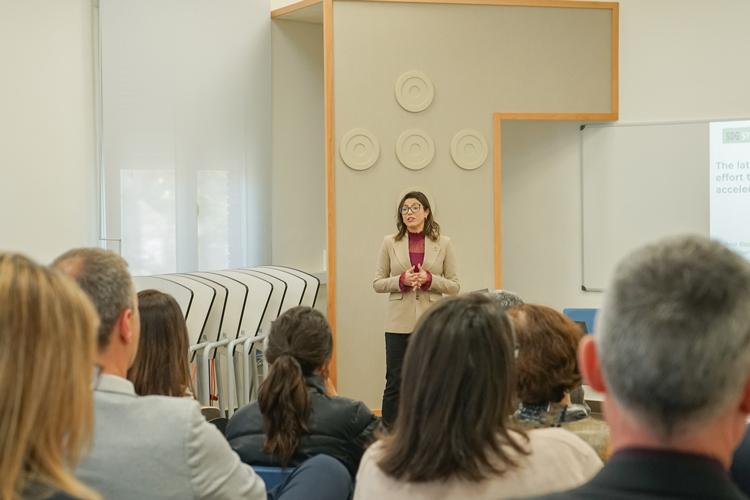Ana Rosa Soares, Director of Evaluation Synthesis with the United Nations Independent Evaluation Office, visited IQS on 13 April to discuss the 2030 Agenda and the Sustainable Development Goals (SDGs).

In terms of the Sustainable Development Goals (SDGs), “it's not about meeting one goal or all 17, it involves including everyone.” This is one of the conclusions stated by Ana Rosa Soares, Director of Evaluation Synthesis with the United Nations Independent Evaluation Office, during a discussion at IQS on the 2030 Agenda and the Sustainable Development Goals (SDGs).
The evaluator began her presentation by explaining why the Millennium Development Goals, defined in 2000, evolved into the current SDGs, established in 2015. The latter include evaluation, monitoring, and review. This rigorous process evaluates information from country-led studies and compares it against the indicators defined by the United Nations Evaluation Office to then study the information. This department also seeks to hold countries accountable for their own results and to implement the necessary measures to achieve the established objectives.
SDGs: going beyond recommendations
The Global SDG Synthesis Coalition has been created this year, an initiative organized around the five pillars of the SDGs (people, planet, prosperity, peace, and partnership) with the aim of accelerating the process towards the achievement of the 2030 Agenda. To that end, the United Nations is already making efforts to obtain strong evidence at the global level on what has worked, where, and why, leading to key conclusions on the main obstacles and successes. The aim of all this is to be able to offer political lessons on how to achieve the objectives by 2030. “We don't want to limit ourselves to making recommendations to countries, we want to help them,” said Ana Rosa Soares.
To facilitate gathering and evaluating the evidence provided by countries, the SDG Synthesis Coalition is developing the AIDA artificial intelligence platform, which will be able to link, analyse, and contrast large amounts of data obtained at the global level.
Soares said the UN's goal is to be able to carry out an initial round of synthesis before 2025 and, after that, a final one before the “goal” in 2030. Two key conferences will be held this year to evaluate the SDGs: the High-level Political Forum on Sustainable Development in July and the SDG Summit in September 2023.
General wellbeing as a cross-cutting objective
Another key aspect that determines the importance of the 2030 Agenda for Sustainable Development is integration. As Soares explained, the 17 SDGs are interrelated and there is no point in evaluating one goal without taking into account the others.
With this in mind, two fundamental concepts were defined when establishing the 17 objectives: leave no one behind (LNOB) and reaching the furthest behind first (RFBF). Both concepts are based on the principles of equality, equity, and non-discrimination, basic pillars in the struggle for sustainable development by the United Nations.
A detonator for redefining priorities
“The pandemic was a wake-up call,” Soares said. “Priorities changed and things that we had not considered before, such as mental health, began to be taken into account. It was previously unmonitored, and now a lot of effort is being put into paying more attention to it.”
The crises that have erupted in recent years (the COVID pandemic and the war in Ukraine, for example) have produced new challenges that had not been addressed until present. As Ana Rosa Soares explained, it is often difficult to identify if the progress or slowdown in an indicator is due to a crisis, and, in that case, which one or if it is due to other factors. “It's still a challenge right now,” she concluded.










